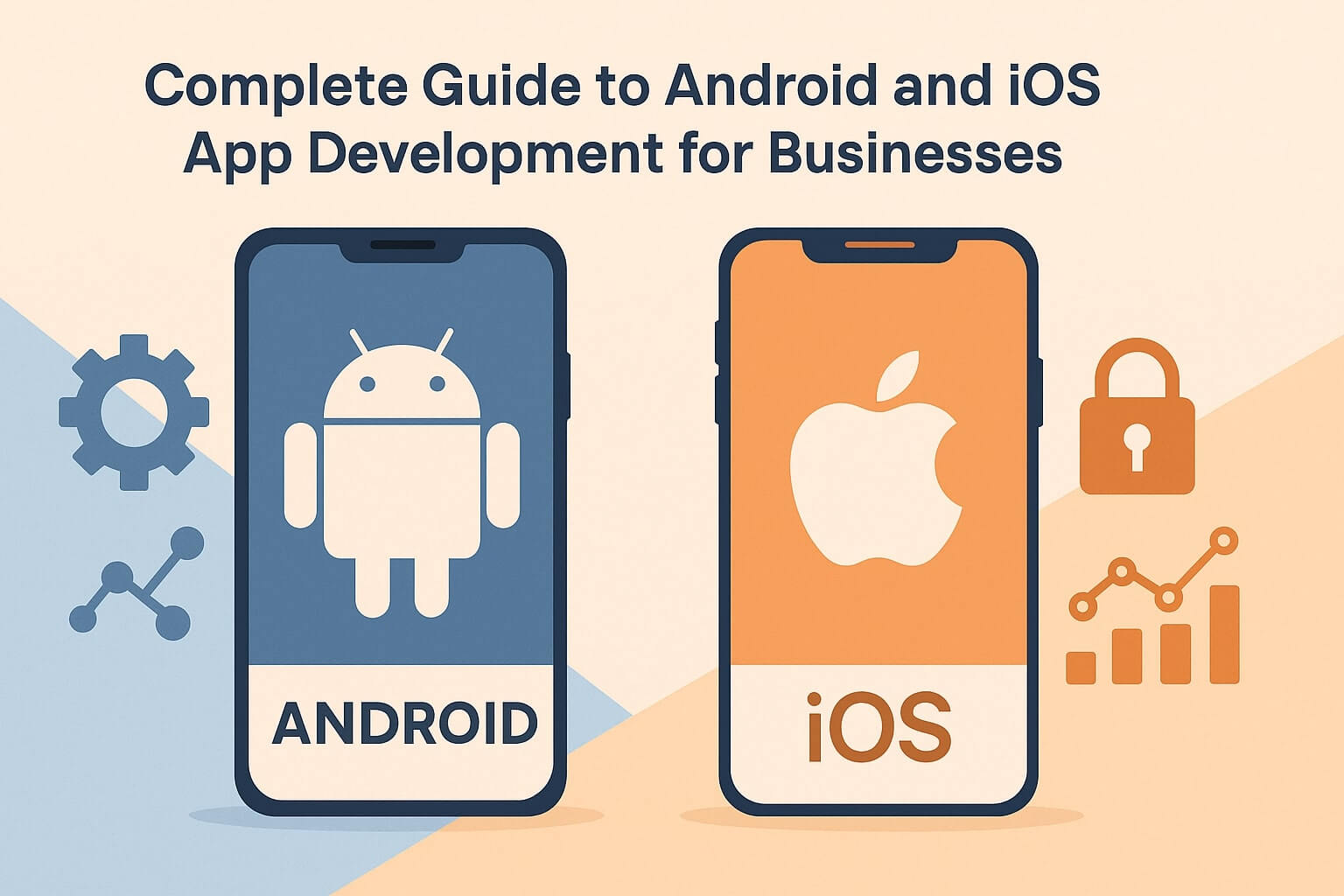Introduction – Why Mobile Apps Are Business Game-Changers
Think about it when was the last time you went an entire day without opening a mobile app?
Probably never.
In today’s digital-first economy, businesses are shifting from websites to mobile apps because they give users faster access, better personalisation, and an always-on connection. Whether you’re ordering food, tracking your fitness, or booking a cab, apps have made life easier and they’re making businesses more profitable.
But here’s the real question: Should you build your app for Android, iOS, or both? Let’s break it down.
The Rise of Mobile-First Business Models
Gone are the days when a mobile-friendly website was enough. Today, if you’re serious about customer engagement, you need a mobile app that offers speed, convenience, and features that can’t be replicated in a browser.
Android vs. iOS – The Ongoing Debate
On one side, Android rules the global market share. On the other, iOS dominates the premium user segment. The decision isn’t just about technology it’s about knowing your audience and business goals.
Understanding Android App Development
Market Share and Popularity of Android
Android holds over 70% of the global mobile market. That means if you want maximum reach, this is your go-to platform. From budget smartphones to flagship devices, Android is everywhere.
Why Businesses Love Android Apps
-
Larger user base
-
Wide device compatibility
-
Open-source flexibility
Common Myths About Android Development
One common myth is that Android apps are always slower to build and harder to maintain. The truth? With the right tools and skilled developers, Android apps can be just as fast and polished as their iOS counterparts.
Weighing the Pros and Cons of Android Development
Before you start coding, you need to understand the ups and downs of building for Android. This isn’t just about coding it’s about strategy.
For a detailed breakdown, check out the pros and cons of android development to see how it aligns with your business needs.
Benefits That Make Android Stand Out
-
Global market penetration
-
Cost-effective hardware options for users
-
Flexibility in customisation
Challenges Developers Often Face
-
Device fragmentation (different screen sizes and versions)
-
Security concerns in some markets
-
Longer testing cycles
How to Overcome These Challenges
Using frameworks like Flutter or Kotlin Multiplatform, and setting up automated testing, can make these challenges manageable.
Affordable Android App Development – Is It Possible?
Yes, absolutely. Many startups assume mobile app development will break the bank, but Android’s open ecosystem and resource availability can make it budget-friendly.
Check this guide on Affordable Android App Development to explore smart cost-cutting approaches without sacrificing quality.
Budget-Friendly Development Strategies
-
Use cross-platform tools when possible
-
Hire developers from cost-effective regions
-
Start with a minimum viable product (MVP)
Outsourcing vs. In-House Development
Outsourcing offers access to global talent and reduces hiring costs. In-house development offers more control but can be expensive.
Choosing the Right Development Partner
Look for experience, client testimonials, and a clear communication process.
Why Android App Bundles Are Changing the Game
Google introduced App Bundles to replace APKs, and the impact has been huge.
Learn more about their potential in Android App Bundles and how they can boost performance.
Understanding What Android App Bundles Are
They’re a publishing format that includes all your app’s compiled code and resources but delivers only what’s needed for each device.
Benefits of Using Bundles for Businesses
-
Smaller app size
-
Faster downloads
-
Better user retention
Performance and Storage Advantages
Because users only download the features they need, performance is smoother, and storage usage is minimal.
Moving to iOS – The Other Side of the Story
iOS Market Share and User Base
While Android dominates in quantity, iOS often wins in quality its users tend to spend more and show higher brand loyalty.
Why Premium Brands Prefer iOS Apps
-
Higher security standards
-
A consistent device ecosystem
-
Access to a wealthier audience
Apple Developer Program – Your Gateway to iOS Success
If you want your app in the App Store, there’s no way around it you need to join the Apple Developer Program.
Here’s everything you need to know about the Apple Developer Program and why it matters.
How to Join the Apple Developer Program
-
Sign up with an Apple ID
-
Pay the annual membership fee
-
Agree to Apple’s terms and policies
Benefits for Businesses and Developers
-
Access to beta software and development tools
-
App Store distribution
-
Advanced analytics and testing tools
Fees, Requirements, and Submission Process
The fee is $99/year. Apple also enforces strict app review guidelines, which can improve overall quality.
Comparing Android and iOS Development
Cost Differences Between the Two Platforms
While Android may seem cheaper to develop, the cost can vary based on app complexity, design, and maintenance.
Performance, Security, and User Experience
-
iOS offers smoother performance due to tight hardware-software integration.
-
Android’s open environment allows for greater flexibility but needs more security planning.
Monetization Opportunities
iOS often leads in paid app downloads, while Android thrives in ad-supported and freemium models.
Factors to Consider Before Choosing a Platform
Target Audience
Where is your audience located? Are they price-sensitive or brand-focused?
Budget and Timeline
How much can you invest, and how fast do you need to launch?
Long-Term Scalability
Think beyond launch consider updates, maintenance, and potential expansion.
Tips for a Successful Mobile App Project
Define Your Goals Clearly
Have a clear vision for what problem your app will solve.
Invest in UI/UX Design
A beautiful, intuitive interface can make or break your app’s success.
Focus on Security and Performance
Users won’t tolerate slow apps or security breaches.
The Future of Mobile App Development
AI, AR, and Emerging Technologies
Artificial intelligence and augmented reality are becoming must-have features for competitive apps.
Cross-Platform Development Tools
Tools like Flutter, React Native, and Kotlin Multiplatform are making it easier to launch apps on both platforms simultaneously.
Conclusion – Choosing the Right Path for Your Business
When to Go Android, When to Go iOS
If you want reach go Android. If you want premium customers go iOS.
Why Some Businesses Choose Both
Many companies launch on one platform first, test the waters, and then expand to the other for maximum coverage.
In the end, it’s not about Android vs. iOS it’s about creating a product your users love, no matter the platform.
Author: Pratik Patel
WEDOWEBAPPS
is
a
leading
USA-based
software
development
company
delivering
end-to-end
digital
solutions
for
enterprises
and
startups.

